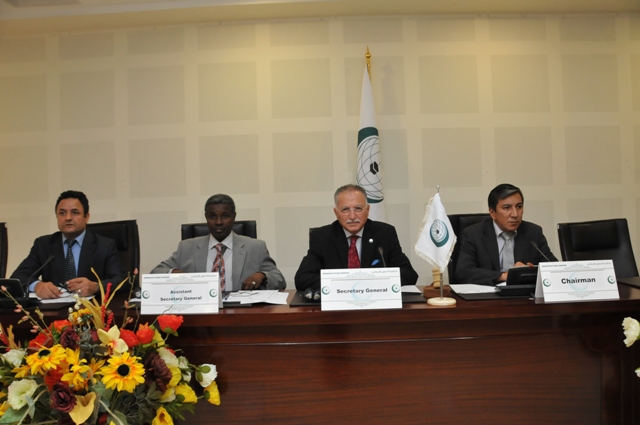
Organisation of Islamic Cooperation
The Collective Voice of The Muslim World
Date: 10/01/2012
 Prof. Ekmeleddin Ihsanoglu, Secretary General of the Organization of Islamic Cooperation (OIC) declared today that the adoption of the Rules for Granting OIC Consultative Status to non-Governmental Organisations, gives the Organization a wide stretch of opportunities to build institutional and fruitful partnership relations with various civil society institutions in the Islamic world.
In his inaugural address to the meeting of the Governmental Expert Group on the Rules for Granting OIC Consultative Status to NGOs , held at the OIC headquarters in Jeddah on Monday, 9th January 2012, Prof. Ihsanoglu said that it was the Islamic leaders’ awareness of the importance of the role assigned to civil society institutions, that prompted the Third Islamic Summit held in Makkah Al Mukarramah at the invitation of the Custodian of the Two Holy Mosques, King Abdulla bin Abdul Aziz Al-Saud, to acknowledge the need to enhance cooperation and coordination relations between the OIC General Secretariat and Civil Society institutions as a key partner in the developmental endeavour.
Prof. Ihsanoglu further indicated that this important decision requires intense efforts to evolve an optimal mechanism to give concrete meaning to the concepts of integration and coordination with the civil society under the OIC umbrella, and affirmed that the adoption of the Rules for NGOs’ access to OIC consultative status, will give added value to the Organization’s work at the international level.
On the other hand, Prof. Ekmeleddin Ihsanoglu pointed out that the General Secretariat’s humanitarian action has witnessed a steady progress with the concerned department having managed to implement a wide range of programs and projects in a number of Islamic States. This has earned much appreciation on the part of the Islamic States, civil society institutions and concerned international organizations, foremost of which the United Nations. The OIC’s humanitarian action has been a significant contributor to the promotion of cooperative relations between the OIC and the Member States’ NGOs, he added.
Ihsanoglu further remarked that the ever-growing role of civil society institutions is not confined to humanitarian action, important as the latter may be. Indeed the impact of these institutions has spread out to other no less important areas such as the issue of environmental protection, human rights, proactive dialogue among civilizations, cultures and religions, as well as woman and child affairs and combating organized crime, to name but a few.
Prof. Ekmeleddin Ihsanoglu, Secretary General of the Organization of Islamic Cooperation (OIC) declared today that the adoption of the Rules for Granting OIC Consultative Status to non-Governmental Organisations, gives the Organization a wide stretch of opportunities to build institutional and fruitful partnership relations with various civil society institutions in the Islamic world.
In his inaugural address to the meeting of the Governmental Expert Group on the Rules for Granting OIC Consultative Status to NGOs , held at the OIC headquarters in Jeddah on Monday, 9th January 2012, Prof. Ihsanoglu said that it was the Islamic leaders’ awareness of the importance of the role assigned to civil society institutions, that prompted the Third Islamic Summit held in Makkah Al Mukarramah at the invitation of the Custodian of the Two Holy Mosques, King Abdulla bin Abdul Aziz Al-Saud, to acknowledge the need to enhance cooperation and coordination relations between the OIC General Secretariat and Civil Society institutions as a key partner in the developmental endeavour.
Prof. Ihsanoglu further indicated that this important decision requires intense efforts to evolve an optimal mechanism to give concrete meaning to the concepts of integration and coordination with the civil society under the OIC umbrella, and affirmed that the adoption of the Rules for NGOs’ access to OIC consultative status, will give added value to the Organization’s work at the international level.
On the other hand, Prof. Ekmeleddin Ihsanoglu pointed out that the General Secretariat’s humanitarian action has witnessed a steady progress with the concerned department having managed to implement a wide range of programs and projects in a number of Islamic States. This has earned much appreciation on the part of the Islamic States, civil society institutions and concerned international organizations, foremost of which the United Nations. The OIC’s humanitarian action has been a significant contributor to the promotion of cooperative relations between the OIC and the Member States’ NGOs, he added.
Ihsanoglu further remarked that the ever-growing role of civil society institutions is not confined to humanitarian action, important as the latter may be. Indeed the impact of these institutions has spread out to other no less important areas such as the issue of environmental protection, human rights, proactive dialogue among civilizations, cultures and religions, as well as woman and child affairs and combating organized crime, to name but a few.